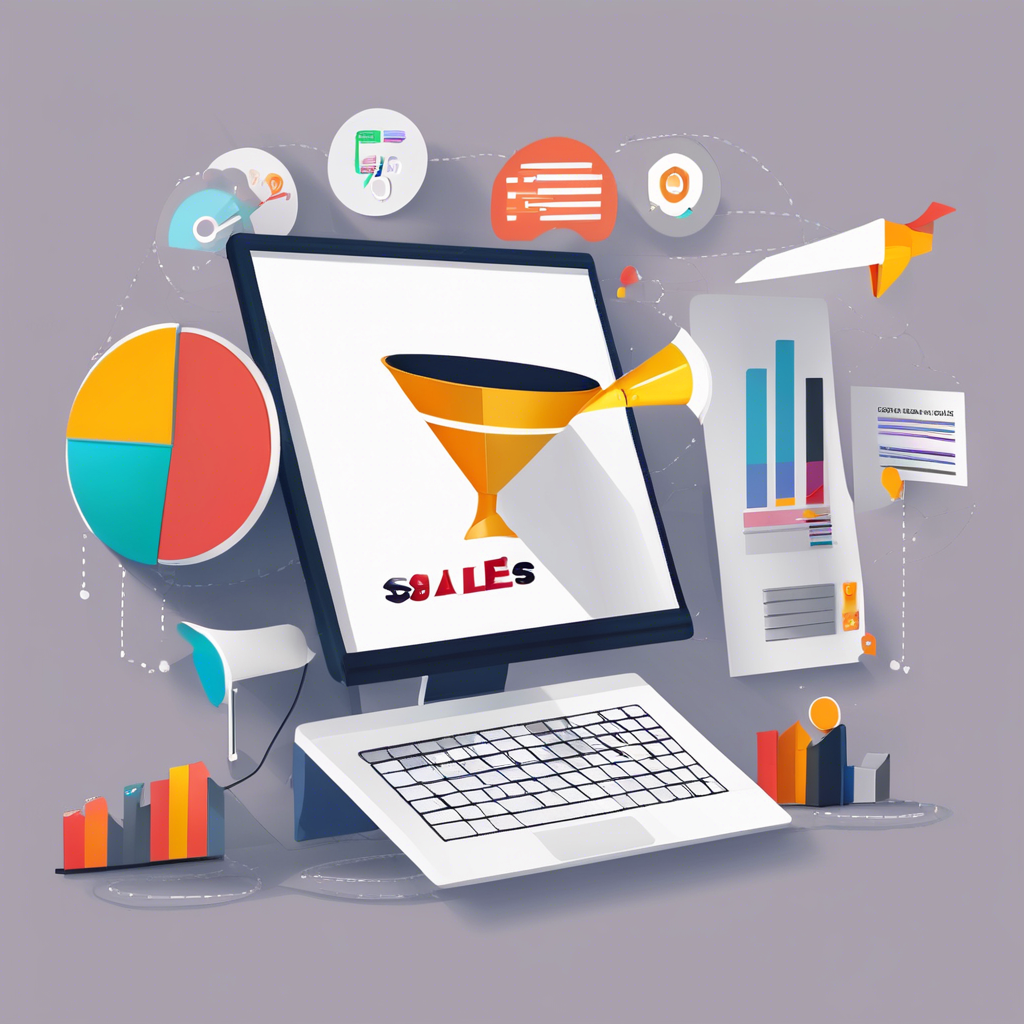Sales funnel software is a crucial tool for businesses of all sizes looking to optimize their sales processes and increase conversions. In today’s digital age, having an effective sales funnel in place is essential for attracting and retaining customers. Sales funnel software helps streamline the customer journey from initial contact to final purchase, ensuring a smooth and efficient experience for both the business and the consumer.
One of the key benefits of using sales funnel software is the ability to track and analyze customer interactions at every stage of the sales process. This data provides valuable insights into customer behavior, allowing businesses to identify areas for improvement and optimize their sales strategies accordingly. By understanding how customers move through the sales funnel, businesses can tailor their marketing efforts to better meet the needs and preferences of their target audience.
Sales funnel software also helps businesses automate repetitive tasks, such as sending follow-up emails and tracking leads. This automation not only saves time and resources but also ensures that no potential sales opportunities slip through the cracks. With sales funnel software, businesses can set up personalized email sequences, schedule follow-up reminders, and track customer responses in real-time, allowing for more efficient and effective communication with prospects.
In addition to streamlining the sales process, sales funnel software can also help businesses improve their overall marketing strategies. By analyzing customer data and tracking key metrics, businesses can gain valuable insights into which marketing channels are most effective at driving conversions. This information can then be used to optimize marketing campaigns, allocate resources more effectively, and identify new opportunities for growth.
Another advantage of using sales funnel software is the ability to create personalized and targeted marketing campaigns. By segmenting customers based on their behavior and preferences, businesses can deliver more relevant and engaging content that resonates with their target audience. This personalized approach not only helps businesses build stronger relationships with customers but also increases the likelihood of converting leads into paying customers.
Sales funnel software also provides businesses with the ability to A/B test different marketing strategies and track the performance of each variation. By testing different elements such as email subject lines, call-to-action buttons, and landing page designs, businesses can identify which tactics are most effective at driving conversions and make data-driven decisions to optimize their sales funnel.
Furthermore, sales funnel software can integrate with other tools and platforms, such as customer relationship management (CRM) systems, email marketing software, and analytics tools. This integration allows businesses to centralize their data and streamline their workflows, making it easier to track customer interactions, analyze performance metrics, and make informed decisions based on real-time data.
One of the key features of sales funnel software is the ability to create customized landing pages and sales funnels tailored to specific marketing campaigns or target audiences. These landing pages are designed to capture leads and guide them through the sales process, ultimately leading to a conversion. By designing visually appealing and user-friendly landing pages, businesses can increase engagement and improve the overall customer experience.
Moreover, sales funnel software often includes built-in analytics and reporting tools that provide businesses with valuable insights into the performance of their sales funnel. By tracking key metrics such as conversion rates, bounce rates, and click-through rates, businesses can monitor the effectiveness of their sales strategies and make data-driven decisions to optimize their funnel for better results.
In addition to tracking key metrics, sales funnel software also allows businesses to set goals and benchmarks for their sales funnel performance. By establishing clear objectives and KPIs, businesses can measure their progress towards achieving their sales targets and identify areas that may need improvement. This goal-setting feature helps businesses stay focused and motivated to continuously optimize their sales funnel for maximum efficiency and effectiveness.
Another important aspect of sales funnel software is its ability to provide real-time notifications and alerts for key events in the sales process. Whether it’s a new lead entering the funnel, a customer completing a purchase, or a prospect showing interest in a product, businesses can receive instant notifications to stay informed and take timely action to nurture leads and close deals.
Furthermore, sales funnel software often includes lead scoring capabilities, which allows businesses to prioritize leads based on their likelihood to convert. By assigning a score to each lead based on factors such as engagement level, demographics, and past interactions, businesses can focus their efforts on high-quality leads that are more likely to result in a sale. This lead scoring feature helps businesses allocate resources more effectively and improve their overall sales performance.
Moreover, sales funnel software can help businesses improve their lead nurturing efforts by automating personalized follow-up sequences based on customer behavior. By sending targeted emails, messages, and offers to leads at the right time, businesses can nurture relationships and move prospects through the sales funnel towards a conversion. This personalized approach not only increases engagement but also helps build trust and credibility with potential customers.
Additionally, sales funnel software can provide businesses with valuable insights into customer preferences and behavior through advanced tracking and analytics capabilities. By monitoring customer interactions across multiple touchpoints, businesses can gain a deeper understanding of customer needs, pain points, and motivations, allowing them to tailor their marketing messages and offerings more effectively.
Another key feature of sales funnel software is its ability to segment and categorize leads based on various criteria, such as demographics, behavior, and purchase history. By grouping leads into different segments, businesses can create targeted marketing campaigns that are more relevant and personalized to each audience, increasing the likelihood of conversion. This segmentation feature helps businesses deliver more tailored and engaging content that resonates with their target market.
Furthermore, sales funnel software often includes advanced lead management tools that allow businesses to track and manage leads throughout the entire sales process. From initial contact to final purchase, businesses can keep track of each lead’s progress, interactions, and engagement level, enabling them to prioritize leads, nurture relationships, and close deals more effectively.
Moreover, sales funnel software can help businesses streamline their sales and marketing efforts by providing a centralized platform for managing leads, tracking performance, and optimizing campaigns. By consolidating all customer data and interactions in one place, businesses can easily access and analyze information to make informed decisions and drive revenue growth. This centralized approach helps businesses stay organized, efficient, and focused on achieving their sales goals.
In conclusion, sales funnel software is a powerful tool for businesses looking to optimize their sales processes, improve conversion rates, and drive revenue growth. By automating repetitive tasks, analyzing customer data, personalizing marketing campaigns, and tracking key metrics, businesses can create a more efficient and effective sales funnel that leads to increased sales and customer satisfaction. With the right sales funnel software in place, businesses can stay ahead of the competition, attract and retain customers, and achieve long-term success in today’s competitive marketplace.

